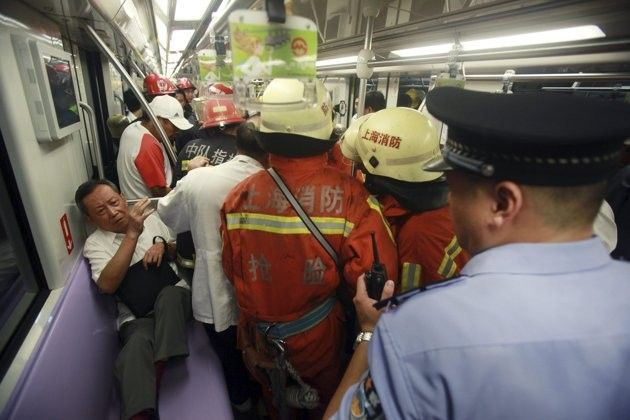Shanghai Metro Blames Controllers for Accident

Shanghai metro officials said the subway crash in the city on Tuesday was the result of a power failure and a manual error.
Two trains collided on Line 10 of Shanghai's metro near the Old West Gate station on Tuesday. The trains were carrying 500 people at the time, 284 of whom were injured in the collision and taken to hospital. Police and rescue workers quickly responded, moving underground to evacuate all the commuters and crew.
Shanghai Shentong Metro Co. Chairman Yu Guangyao originally cited a signal failure as the cause of the accident. Authorities blamed Casco Signal Ltd brand parts manufactured by French company Alstom.
However, new information indicates that the accident was actually caused by a power-outage that disrupted signaling operations. The Metro company now claims that controllers failed to follow proper protocol after the shortage.
The accident came just two months after a deadly bullet train collision occured about 300 miles south of Shanghai.
In July, a high-speed rail crash in Wenzhou left 39 people dead. The two-train head-on accident was also blamed on a signal failure, when a light signalling the trains to stop never illuminated. Before the subway disaster on Tuesday, the crash was China's worst train accident since 2008.
Without safety, high-speed trains will lose their credibility, Premier Wen Jiabao stated in July. This deadly accident has reminded us to attach more importance to the safety of our high-speed railways.
China has recently begun a massive modernization of its national railway system, but a number of accidents and blemishes have angered citizens and tarnished the country's reputation.
A number of state employees have been caught accepting bribes from contractors, which is a serious violation that puts public safety checks into question. In February, Liu Zhijun, who was the railways minister at the time, was fired for accepting 800 million yuan ($125 million) in kickbacks from contractors.
Incidents like these have sparked anger among Chinese citizens, and with slow investigations producing little accountability, many are making their ire known in public and online. In the fist five hours after the crash Tuesday, users on Sino Weibo, a Chinese micro-blogging platform, posted two million comments about the incident.
Do people have to be injured or killed, before [authorities] admit a mistake and correct it?” a blogger named Siyizhi Tianshi wrote on the site.
The Shanghai Metro apologized immediately after the accident, but the online statement was quickly removed, according to reports.
No matter the ultimate cause and responsibility, [we feel] particularly guilty about the harm and losses borne by the public, Shanghai Metro said in a statement on its blog. We will put in our utmost ability to rescue the wounded, resume operations as soon as possible ... and cooperate with the relevant departments in the investigation.
Even if our apologies pale in comparison to the actual injuries, we are deeply sorry.
In an unrelated story, a train passenger in Jiangxi province was beaten to death by three crew members on Monday after he intervened in an argument, according to Jiangxi Television. Twenty passengers said they witnessed the event, in which the train staff strangled and pummeled to the middle-aged commuter.
© Copyright IBTimes 2024. All rights reserved.





















